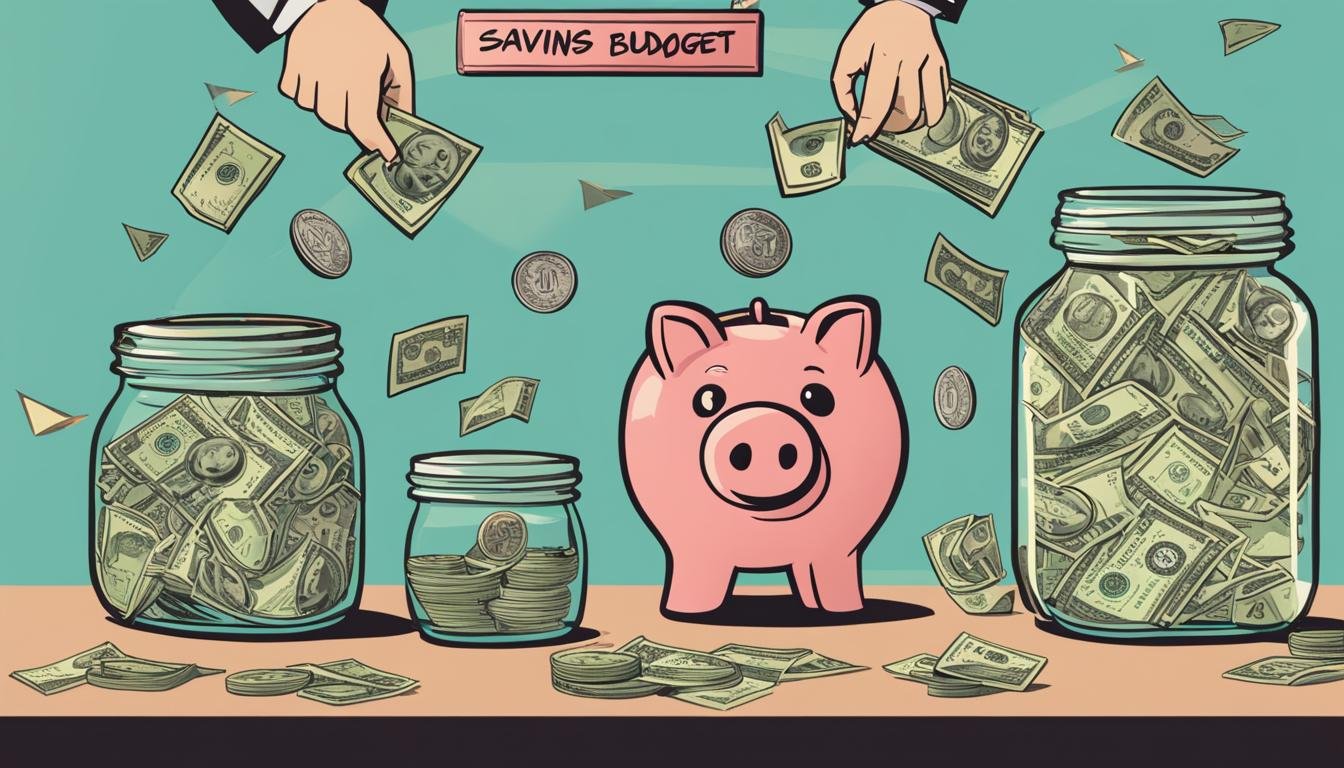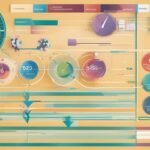Effective personal budgeting is paramount for achieving financial success. By implementing advanced strategies, you can take control of your money and make intentional decisions about how to allocate and spend it. Whether you’re looking to maximize savings, pay off debt, or reach your long-term financial goals, employing these strategies can help you stay on track and achieve financial freedom.
Key Takeaways
- Implementing advanced strategies is crucial for successful personal budget management.
- Effective budgeting helps you take control of your finances and make intentional decisions.
- Maximizing savings, paying off debt, and reaching financial goals are achievable through strategic budgeting.
- Stay on track and achieve financial freedom by employing these advanced budgeting strategies.
- Remember to regularly review and adjust your budget as your financial circumstances change.
15 Budgeting Tips for Success
Incorporating these tips can help you achieve financial success. By implementing these strategies, you can take control of your finances and work towards your financial goals.
Budget to Zero
Before the month begins, account for every dollar and assign it a purpose. This ensures that your money is allocated efficiently and eliminates any wasteful spending.
Budgeting Together
Involve your partner or family members in the process. By working together, you can increase accountability and strengthen your financial goals.
Budget for Different Months
Plan your budget in advance for different months and anticipate expenses. This allows you to allocate money for seasonal events or irregular expenses, ensuring that you are fully prepared.
Prioritize Important Categories
Identify the most important categories, such as rent, utilities, and debt payments. Allocate a sufficient amount of money to cover these expenses first to ensure financial stability.
Pay off Debt
Make paying off debt a top priority in your budget. By allocating a portion of your income towards debt payments, you can reduce your debt burden and improve your financial situation.
Trim the Budget
Look for areas where you can cut back on spending and save money. Trim unnecessary expenses and find ways to reduce costs, such as renegotiating bills or finding cheaper alternatives.
Set Auto Drafts
Simplify your bill payment process by setting up automatic drafts for recurring expenses. This helps ensure that you never miss a payment and helps you stay on track with your budget.
Have Goals
Set clear financial goals for yourself and regularly review your progress. Having specific goals in mind keeps you motivated and focused on achieving financial success.
Track Progress
Maintain a record of your income and expenses, and regularly review your budget. Tracking your progress helps you identify areas where you may need to adjust your spending habits or make changes.
Include Miscellaneous Expenses
Account for unexpected or miscellaneous expenses in your budget. Having a category specifically for these expenses allows you to be prepared for any unforeseen costs that may arise.
Cut Up Credit Cards
If you struggle with credit card debt, consider cutting up your credit cards to avoid unnecessary spending. Paying with cash or debit cards can help you stay within your budget and avoid accumulating additional debt.
Use Cash for Certain Categories
For categories where you tend to overspend, consider using cash instead of cards. When you physically see the money leaving your wallet, it’s easier to stick to your budget and avoid impulsive purchases.
Try an Online Budget Tool
Explore online tools that can simplify the process and provide you with valuable insights into your financial situation. These tools can help you categorize expenses, set goals, and track your progress.
Be Content
Avoid the temptation of comparing yourself to others and feeling the need to keep up with their lifestyle. Learn to be content with what you have and focus on your own financial goals and priorities.
Give Yourself Grace
Remember that this is a journey, and it’s okay to make mistakes or have setbacks. Give yourself grace and be patient as you work towards improving your financial situation.
By incorporating these tips into your financial management practices, you can take control of your money, achieve your financial goals, and pave the way for long-term financial success.
More From Personal Finance
Understanding The Difference Between Financial Needs & Want’s
Understanding Personal Finance
Budgeting Methods: 50-20-30, Zero-Based, Envelope, Weekly Allowance, Gig Worker’s Budget
When it comes to budgeting, there are several effective methods you can choose from to suit your financial goals and lifestyle. Let’s explore some popular methods:
1. 50-20-30 Budget
The 50-20-30 budget is a simple yet effective method that divides your income into three categories:
- 50% for essential expenses
- 20% for savings and debt reduction
- 30% for wants and discretionary spending
This method provides a clear allocation of your income, allowing you to prioritize your financial responsibilities while still enjoying some flexibility with your discretionary spending.
2. Zero-Based Budgeting
Zero-based budgeting is a method that ensures every dollar is accounted for by subtracting your expenses from your total income until you reach zero. With this approach, you allocate your income towards your expenses, savings, and goals, leaving no room for unaccounted spending.
3. Envelope Budgeting
Envelope budgeting is a traditional yet effective method that involves using physical envelopes to allocate cash for different spending categories. Each envelope represents a specific expense, such as groceries, transportation, or entertainment. By strictly sticking to the designated amount in each envelope, you can effectively manage your spending and avoid overspending in any category.
4. Weekly Allowance
The weekly allowance method focuses on setting a weekly budget for your discretionary expenses. You allocate a specific amount of money for non-essential spending, such as dining out, entertainment, or hobbies. By planning your expenses on a weekly basis, you can better control your spending and avoid unnecessary financial stress.
5. Gig Worker’s Budget
For individuals with fluctuating incomes, such as gig workers or freelancers, the gig worker’s budget provides a flexible approach to budgeting. This method involves averaging your income and expenses over the course of a year. By considering both high and low earning periods, you can create a budget that accommodates your fluctuating earnings and ensures financial stability throughout the year.
Remember, the key to successf lies in finding a method that aligns with your financial goals and lifestyle. Whether you prefer a structured approach like the 50-20-30 budget or a more flexible method like the gig worker’s budget, the key is to consistently track and manage your finances to achieve your financial aspirations.
| Budgeting Method | Description |
|---|---|
| 50-20-30 Budget | Divide income into three categories: 50% for essential expenses, 20% for savings and debt reduction, and 30% for wants and discretionary spending. |
| Zero-Based Budgeting | Account for every dollar by subtracting expenses from total income until reaching zero. |
| Envelope Budgeting | Use physical envelopes to allocate cash for different spending categories, ensuring strict adherence to designated amounts. |
| Weekly Allowance | Set a weekly amount specifically for discretionary expenses, controlling spending on a weekly basis. |
| Gig Worker’s Budget | Average income and expenses over a year to create a budget that accommodates fluctuating earnings. |
The Importance of Budgeting and Financial Literacy
It is a fundamental aspect of achieving financial stability and long-term success. By creating a budget, you gain control over your finances and gain the ability to make informed spending decisions. It serves as a roadmap for planning your expenses, reducing debt, and saving for the future.
Developing financial literacy is equally important in your journey towards financial well-being. By understanding basic financial concepts and improving your financial knowledge, you enhance your skills and empower yourself to make sound financial choices.
Research has shown that individuals who prioritize financial education and acquire financial literacy skills are more likely to exhibit improved financial behavior and increase their savings rates. By committing to a budget and prioritizing financial literacy, you gain the necessary tools to take control of your financial future and build a strong foundation for wealth accumulation.





